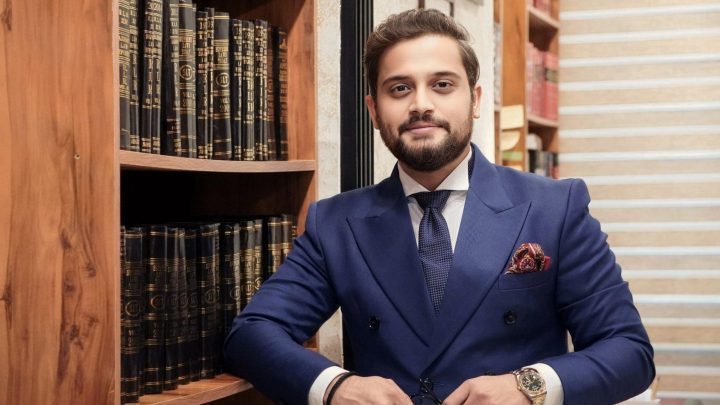Founder
9409
0
0
“For young professionals aspiring to establish a career in commercial litigation and high-stakes legal matters, my foremost advice would be to develop a strong foundation in key legal areas and cultivate the appropriate mindset to navigate the complexities of this profession.” – Pranav Gupta, Founder of PG Law Offices.
This interview was taken by SuperLawyer Team
Posted on April 02, 2025
This interview has been published by Anshi Mudgal and The SuperLawyer Team

With your remarkable expertise across multiple areas of law, including Insolvency & Bankruptcy Code, White Collar Crimes, and Real Estate Laws, what initially inspired you to pursue a career in law? Looking back, could you also share how your internship experiences and time in law school influenced and shaped your decision to delve deeply into these complex legal fields?
My inspiration to pursue a career in law stems from a deep-seated passion for justice and the dynamic nature of legal practice. However, my journey into the intricate fields of Insolvency & Bankruptcy, White Collar Crimes, and Real Estate Laws has been profoundly shaped by the remarkable mentors and experiences I have had along the way.
I have been fortunate to have Mr Sumant Batra as my guru, under whose guidance I had the privilege of working at Kesar Das & Associates. Learning the nuances of the Insolvency and Bankruptcy Code under his tutelage was a transformative experience, reinforcing my commitment to mastering this ever-evolving field. His intellectual acumen and visionary approach continue to inspire me.
Additionally, Senior Advocate Mr Abhimanyu Bhandari has been a role model for me, and I greatly admire his exceptional legal acumen and courtroom presence. The invaluable guidance of Mr Pulkit Deora & Mr Aditya Shankar Prasad has also played a pivotal role in my professional growth, particularly in navigating the complexities of IBC.
My formative years in law school were further enriched by exceptional internship experiences under some of the finest legal minds in the country. I had the privilege of working under Senior Advocates such as Mr Salman Khurshid, Mr KTS Tulsi, and Mr Vivek Tankha, among others. Their mentorship not only honed my legal skills but also instilled in me the discipline, diligence, and perseverance required to excel in this profession. Their unwavering commitment to the law has always motivated me to strive for excellence.
Looking back, these experiences have not only shaped my legal career but have also reinforced my belief that law is not merely a profession but a lifelong pursuit of knowledge, advocacy, and justice. I remain committed to contributing meaningfully to the legal fraternity, continuously evolving with the ever-changing landscape of law.
During the early stages of your career, as you worked with various prominent law firms, what key experiences helped refine your understanding of specialized areas like Intellectual Property, Insolvency & Bankruptcy, and other subjects? How did these formative years contribute to honing your skills and preparing you to tackle high-profile cases in these areas?
During the early stages of my career, I was privileged to work with some of the most esteemed legal professionals, and these experiences played a pivotal role in refining my understanding of specialised areas such as Intellectual Property and Insolvency & Bankruptcy.
My interest in Intellectual Property law was sparked during my time at the chamber of Mr Salman Khurshid, where I had the distinct opportunity to work on a personal legal matter of his. This exposure provided me with invaluable insights into the intricate nature of IPR disputes and their strategic nuances. I was particularly fortunate to have the guidance of his associates, including Mr Aadil Singh Boparai, former Additional Advocate General of the State of Punjab, who ensured that I remained actively engaged in complex IPR matters. Their mentorship deepened my appreciation for the field and solidified my interest in intellectual property rights.
Similarly, my passion for Insolvency & Bankruptcy law developed during my tenure at IVY Law Offices. It was there that I had the privilege of briefing and observing stalwarts such as Mr Abhimanyu Bhandari and Mr Sumant Batra on IBC matters concerning prominent real estate giants. This first-hand exposure to high-stakes insolvency proceedings not only enhanced my technical knowledge but also sharpened my strategic thinking and advocacy skills in this domain.
These formative years were instrumental in shaping my legal acumen, allowing me to develop a structured, analytical approach to handling complex cases. They provided me with a strong foundation, preparing me to navigate high-profile matters with confidence and precision. Looking back, these experiences have not only influenced my career trajectory but have also reinforced my commitment to excellence in these specialised areas of law.
After working with esteemed law firms, what motivated you to establish your own practice? Were there any significant hurdles or challenges that you faced while setting up your firm, and how did you overcome them? Additionally, what was your vision behind taking this significant step in your career?
From the very outset of my legal career, I harboured a strong desire to work for myself, but I was conscious that before taking such a step, I needed to gain a thorough understanding of the law in specific areas. My time with esteemed law firms provided me with invaluable exposure, but I always knew that establishing my own independent practice would allow me to shape my professional journey in a way that aligned with my aspirations.
One of my foremost motivations for starting my own practice was my ambition to establish myself as an arguing counsel. I believed that stepping into independent practice was the ideal way to hone my advocacy skills and take on more significant litigation roles. Throughout this journey, I have been fortunate to have the unwavering support of my seniors, including Mr Aaditya Shankar Prasad, and my loved ones, who have always encouraged me during challenging times.
Of course, the decision to leave a well-salaried job to venture into independent practice was not an easy one. The financial uncertainty that comes with such a transition is daunting, but I was fortunate to have a few clients from my very first job, which provided me with a foundation to build upon. Instead of being deterred by the challenges, I remained focused on specific areas of law—particularly Insolvency & Bankruptcy and Real Estate disputes—that would allow me to generate work and grow my practice strategically.
My vision has always been clear—to establish myself as one of the finest litigation lawyers in the fields of IBC and Real Estate disputes. I am committed to continuous learning, refining my advocacy, and making a meaningful contribution to these specialised areas of law. The journey so far has been demanding yet deeply fulfilling, and I look forward to further strengthening my expertise and reputation in the years to come.
Your extensive expertise in Insolvency and Bankruptcy (IBC), particularly in cases involving companies such as Earthcon Universal Infratech and Unity Group, UNIBERA CIRP, and other CIRP cases have been widely recognized. From your experience, what are the most common challenges that businesses and creditors face in these proceedings? How do you adapt your approach to each unique case to ensure the best possible outcome for your clients?
My experience in handling Corporate Insolvency Resolution Processes (CIRP) for companies such as Earthcon Universal Infratech, Unity Group, UNIBERA CIRP, and several other real estate insolvency cases has provided me with deep insights into the challenges faced by various stakeholders, particularly creditors.
In real estate insolvencies, homebuyers and operational creditors often emerge as the primary victims of the litigation process. The insolvency framework, both legislatively and judicially, has traditionally prioritised financial creditors, leaving operational creditors in a precarious position. One of the most pressing challenges they face is their exclusion from the Committee of Creditors (CoC), which consists predominantly of financial creditors. This exclusion severely limits their ability to influence resolution plans, often resulting in minimal or, at times, no recoveries at all. The disparity in treatment has led to persistent concerns regarding the fairness of the insolvency resolution process and calls for reforms to ensure a more equitable distribution of assets among all stakeholders.
Each case presents its own set of complexities, and my approach is always tailored to achieve the best possible outcome for my clients. For operational creditors, the key lies in strategically asserting their rights within the existing legal framework while pushing for a more balanced interpretation of insolvency laws. This often involves challenging unfair treatment before tribunals and courts to ensure that their interests are not completely disregarded. For homebuyers, the focus remains on maximising recoveries through structured legal strategies and advocating for resolutions that safeguard their investments.
Navigating insolvency proceedings requires a combination of legal expertise, strategic foresight, and a deep understanding of financial intricacies. My goal is always to bridge the gap between legal provisions and practical realities, ensuring that my clients—whether operational creditors, homebuyers, or other stakeholders—receive the strongest possible representation to protect their interests in an otherwise complex and often unfavourable system.
You have handled several high-profile money laundering cases before the PMLA. Could you share the most challenging white-collar crime case you’ve dealt with and how you navigated the intricate legal challenges involved? What strategies did you employ to ensure a successful defense?
As a legal practitioner handling complex white-collar crime cases under the Prevention of Money Laundering Act (PMLA), confidentiality and discretion are paramount. While I cannot disclose specific details due to the sensitive nature of these matters, I can broadly share that I have worked on several high-profile cases, including a widely publicised airline scam, two major bank fraud cases, real estate-related laundering matters, and a case involving a prominent political figure who was a former Chief Minister of a state.
Each of these cases presented unique challenges, particularly due to the interplay of multiple statutes, cross-border transactions, voluminous financial records, and the rigorous scrutiny of enforcement agencies. Navigating such intricate legal complexities required not only a deep understanding of PMLA but also a strategic, multi-faceted defence approach.
Under the guidance of my esteemed seniors, I gained invaluable experience in tackling these high-stakes matters. The key to an effective defence in PMLA cases often lies in meticulously dissecting financial trails, challenging procedural lapses, and ensuring that the fundamental rights of the accused are upheld throughout the proceedings. A proactive approach—combining thorough legal research, forensic financial analysis, and strategic litigation—was instrumental in mounting a strong defence.
Beyond the legal technicalities, these cases reinforced the importance of adaptability and precision in white-collar crime litigation. Each matter provided a profound learning experience, further honing my expertise in handling intricate financial crime cases and reinforcing my commitment to delivering the highest standard of legal representation in this challenging domain.
As a legal advisor to CREDAI and with your extensive experience in real estate advisory, what do you consider to be the most pressing legal challenges facing the real estate sector in India today? How do you foresee the sector evolving, especially in terms of legal reforms and challenges in the coming years?
As a legal advisor to CREDAI and someone who has been deeply involved in real estate advisory and litigation, I have witnessed first-hand the evolving legal landscape of the sector. From the outset of my legal career, I was drawn to real estate law, and my expertise in this domain led to independent advisory roles for several prominent developers. Today, I have the privilege of advising over a dozen builders, guiding them through the intricate legal framework that governs this critical industry.
The real estate sector in India faces a myriad of legal challenges, many of which stem from regulatory uncertainties, compliance burdens, and financial complexities. One of the most pressing issues is the interplay between multiple laws—such as the Insolvency and Bankruptcy Code (IBC), the Real Estate (Regulation and Development) Act (RERA), the Arbitration and Conciliation Act, the SARFAESI Act, the Negotiable Instruments Act, and various criminal laws—each of which plays a significant role in real estate disputes. Developers often find themselves entangled in prolonged litigation, particularly in insolvency matters, while homebuyers and other stakeholders struggle with delays in project delivery. Ensuring a balanced approach that protects consumer rights while providing a viable legal framework for developers remains a crucial challenge.
In my role as an advisor to CREDAI, I have handled high-stakes cases worth billions of rupees, appearing before the Hon’ble High Court and the Supreme Court of India. These experiences have reinforced my belief that the real estate sector holds immense potential for growth, provided that both developers and policymakers work in tandem to create a more transparent and efficient regulatory environment. The government must take proactive steps to streamline approval processes, enhance dispute resolution mechanisms, and promote investment-friendly policies. At the same time, developers must ensure strict compliance with legal frameworks to build credibility and sustain long-term growth.
Looking ahead, I foresee significant legal reforms aimed at strengthening investor confidence and addressing the structural bottlenecks that often hinder real estate development. Countries like the UAE, particularly Dubai, have demonstrated how robust legal frameworks and government support can drive infrastructure growth and urban development. India must follow a similar trajectory by fostering a legal environment that encourages both domestic and foreign investments while ensuring fair treatment of all stakeholders.
For young lawyers, the real estate sector presents a strong foundation in the early years of practice. Given its interdisciplinary nature, I strongly recommend mastering key legal areas such as IBC, RERA, arbitration, SARFAESI, the NI Act, and criminal law, all of which are extensively utilised in real estate litigation. The sector is not only financially rewarding but also offers immense opportunities for those willing to navigate its complexities with diligence and expertise.
With your extensive and diverse experience in the legal field, what advice would you offer to young professionals who aspire to build a successful career in commercial litigation and high-stakes legal matters? What skills or mindset do you believe are crucial for excelling in these challenging areas of law?
For young professionals aspiring to establish a career in commercial litigation and high-stakes legal matters, my foremost advice would be to develop a strong foundation in key legal areas and cultivate the appropriate mindset to navigate the complexities of this profession. Building meaningful professional relationships, working diligently during law school, and dedicating oneself to internships are essential elements in laying the groundwork for a successful legal career. Engaging in continuous internships, contributing to legal scholarship through writing, and staying updated with the latest judicial developments are indispensable practices for any law student. These endeavours not only refine legal skills but also provide a competitive edge in an ever-evolving field.
To young lawyers, including those at the early stages of their careers, I would offer similar guidance—work with diligence and identify an environment where your skills and aspirations align. Understanding one’s own strengths and capabilities is crucial, as is recognising when and where to apply them effectively. Strategic application of one’s abilities at the right stage can make a significant difference in professional growth and success.
For those entering this field, I strongly recommend gaining proficiency in statutes that frequently intersect with commercial disputes, such as the Insolvency and Bankruptcy Code (IBC), the Real Estate (Regulation and Development) Act (RERA), the Arbitration and Conciliation Act, the SARFAESI Act, the Negotiable Instruments Act, and relevant provisions of criminal law. A thorough command of these statutes not only enhances legal acumen but also equips aspiring litigators with the requisite tools to handle complex financial and contractual disputes with confidence and precision.
Furthermore, it is imperative to acknowledge that, in the legal profession, financial success should not be the primary objective. Instead, establishing a strong reputation through dedication, resilience, and unwavering commitment to the practice of law is of paramount importance. Recognition and professional success follow those who invest in their craft with sincerity and perseverance. It is through consistent effort, integrity, and expertise that one truly distinguishes oneself in the legal profession.
Commercial litigation and high-stakes legal practice present immense opportunities for those willing to embrace the challenges. With the right mentorship, a commitment to continuous learning, and a strategic approach, young lawyers can carve a distinguished career in this demanding yet highly rewarding field. True success, recognition, and a lasting reputation are achieved not by seeking shortcuts but by consistently demonstrating excellence, ethical integrity, and an unwavering dedication to the law.
Given the demanding nature of your legal career, balancing professional responsibilities with personal well-being can be challenging. How do you manage to strike a harmonious balance between your professional and personal life, and what strategies do you use to ensure both aspects thrive without compromising either?
Balancing professional responsibilities with personal well-being is indeed a challenge in the legal profession, given its demanding nature. However, I firmly believe that a good lawyer must not only excel in their practice but also take care of every aspect of life to ensure long-term success and fulfilment.
For me, achieving this balance starts with mindful time management and setting clear priorities. While my professional commitments require unwavering dedication, I make a conscious effort to nurture my personal life as well. Travelling is something I truly enjoy, as it allows me to disconnect from the routine, gain new perspectives, and return with renewed energy. Spending quality time with my parents and staying in touch with loved ones are also essential aspects of my life, as they provide emotional support and grounding amidst a busy schedule.
Additionally, I have always been eager to meet new people and engage in social interactions, as I believe that meaningful conversations and diverse perspectives contribute immensely to both personal and professional growth. Beyond work, I ensure that I dedicate time to my physical well-being through regular exercise and sports, which help in maintaining focus, reducing stress, and enhancing overall productivity.
Ultimately, I believe that a well-rounded approach to life is key to excelling in the legal profession. By staying connected with loved ones, pursuing interests beyond work, maintaining a healthy lifestyle, and embracing new experiences, I strive to ensure that both my professional and personal life thrive without compromise.
Get in touch with Pranav Gupta –







No comments yet
Be the first to share your thoughts about this interview.